
‘Authentic desi food in Doha’: The story of Punjab Restaurant
There is a rapidly growing neighbourhood in Doha called Msheireb, where new developments are springing up. They are designed with accessibility and modernity in mind but still pay homage to Qatari culture. For years, a squat little building has stood little changed as Doha has evolved around it, its cheerful green sign proclaiming that you have arrived at Punjab Restaurant.
Between the time that Punjab served us an epic meal and the writing of this article, the restaurant has moved a few buildings over, its original space now being rebuilt into something else. Such is the pace of development in Doha, which makes the traditional charm of places like Punjab that much more appealing.
The restaurant is the kind of no-nonsense place that tells you right away that you are about to have an amazing Pakistani meal prepared by cooks who know what they are doing. It was founded 40 years ago and has given exactly zero nods to “keeping up with the times” because the people who run it know they have a winning formula.
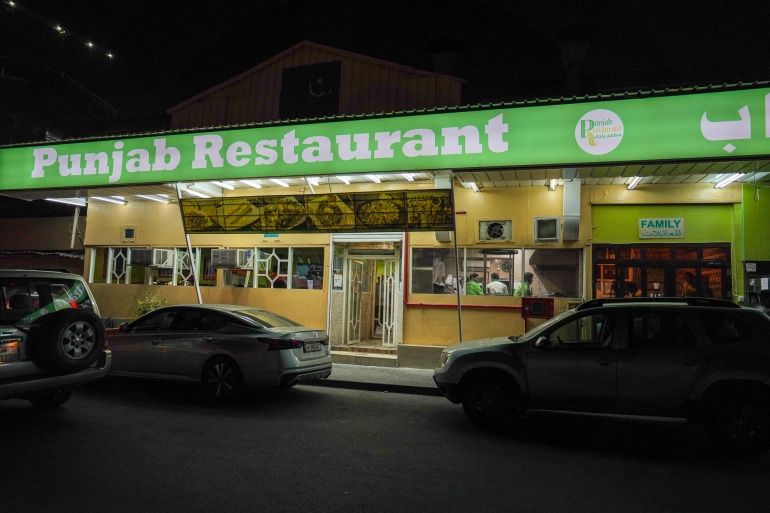 For years, a squat little building stood steadfast as life changed around it
For years, a squat little building stood steadfast as life changed around itWalking in, you can see the kitchen on the right behind big glass panels that offer a glimpse of the chefs working around roaring flames and enormous karahis (wok-like pans used in South Asian cooking). Hidden from immediate view is a tandoor oven tended by two men energetically slapping bread onto its walls and using long hooks to pull it off as it bakes.
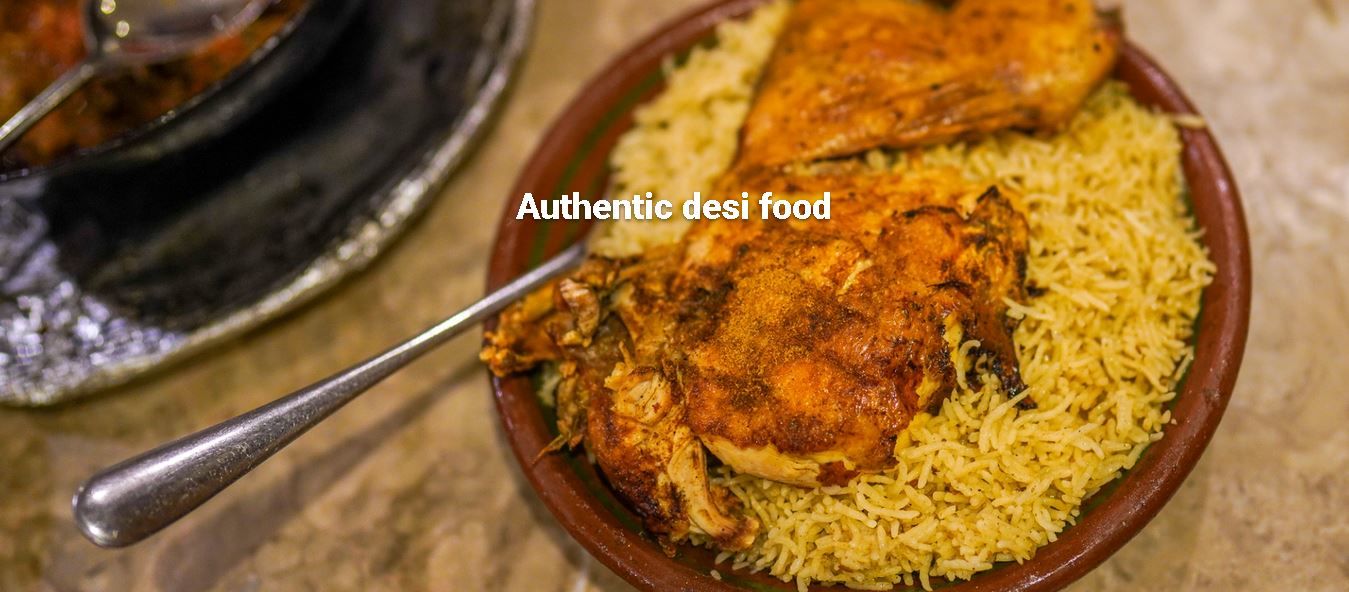 The chicken sajji is a sleeper hit
The chicken sajji is a sleeper hit
We head upstairs to check out the family section, which has been recently redone with wood panelling, padded seating and expansive tables. Picking a table with a view of the dumbwaiter - yes, a real dumbwaiter to carry food up and dirty dishes back down - we settle in to wait for Behzad Khan, the manager.
A menu is brought to the table, proclaiming “Authentic Desi Food in Doha!” on its front cover. It is a daunting document to go through because the restaurant offers about 350 dishes and specials every day of the week. Luckily, Khan arrives at that moment, fresh and unflustered in a pressed shalwar kameez.
Agreeing proudly that the menu is indeed extensive, he says the restaurant’s many regulars have the specials pretty much memorised and come for their favourites on the appropriate days.
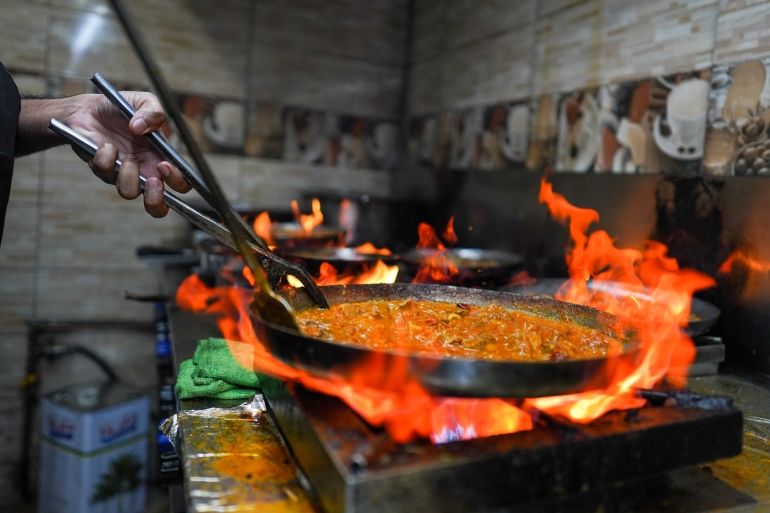 Shinwari mutton karahi is as classic as it is widely loved
Shinwari mutton karahi is as classic as it is widely loved
Settling in, he starts offering some helpful advice on what to order for a good sampling of Punjab’s food.
The Shinwari mutton karahi is a must, Khan says firmly. It is as classic as it is widely loved, so it goes on the list. The karahis are made by an agile cook who stands in front of about five roaring gas flames, juggling the bubbling pans of mutton or chicken in a rich sauce. These are smaller karahis than the mammoth pans used for cooking huge batches of desserts that we had seen chefs hauling through the kitchen earlier.
These also have no handles, and the chef uses what looks like a long pair of pliers to manoeuvre the pan with one hand while stirring quickly with the other. Each pan is at a different stage of preparation. Some are just starting out with onions simmering in ghee. Some have had the tomatoes added as they reduce; others have chunks of mutton or chicken cooking in the tomatoes.
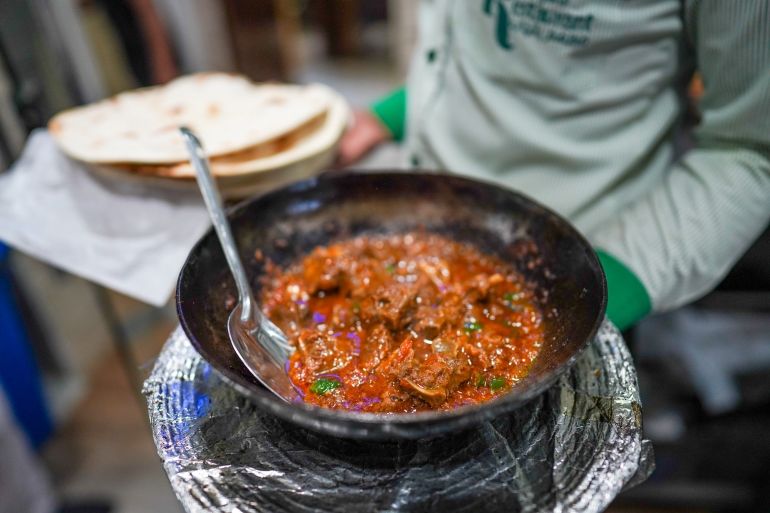 A karahi on its way out to eager diners
A karahi on its way out to eager diners
No matter what phase the karahi is in, it is clamped by the long pliers and stirred vigorously every couple of minutes. And the chef never falters. He knows which pan needs spices sprinkled into it and which one is ready to be finished with a dusting of chopped herbs. Understandably, he is too busy to chat - he just looks up and nods briefly.
To finish off a karahi, blast the heat, add some yoghurt and garam masala, and then top it with some finely chopped parsley and coriander for that zing.
In another corner of the kitchen, near the front, is an open charcoal fire with chickens on skewers placed around it. These chicken sajjis have been recommended for tonight’s feast and are today’s special - chicken that has been grilled slowly for hours around that fire and will be finished off with a final, lemony pan-sear and served on top of flavourful rice cooked in a chicken-mutton broth.
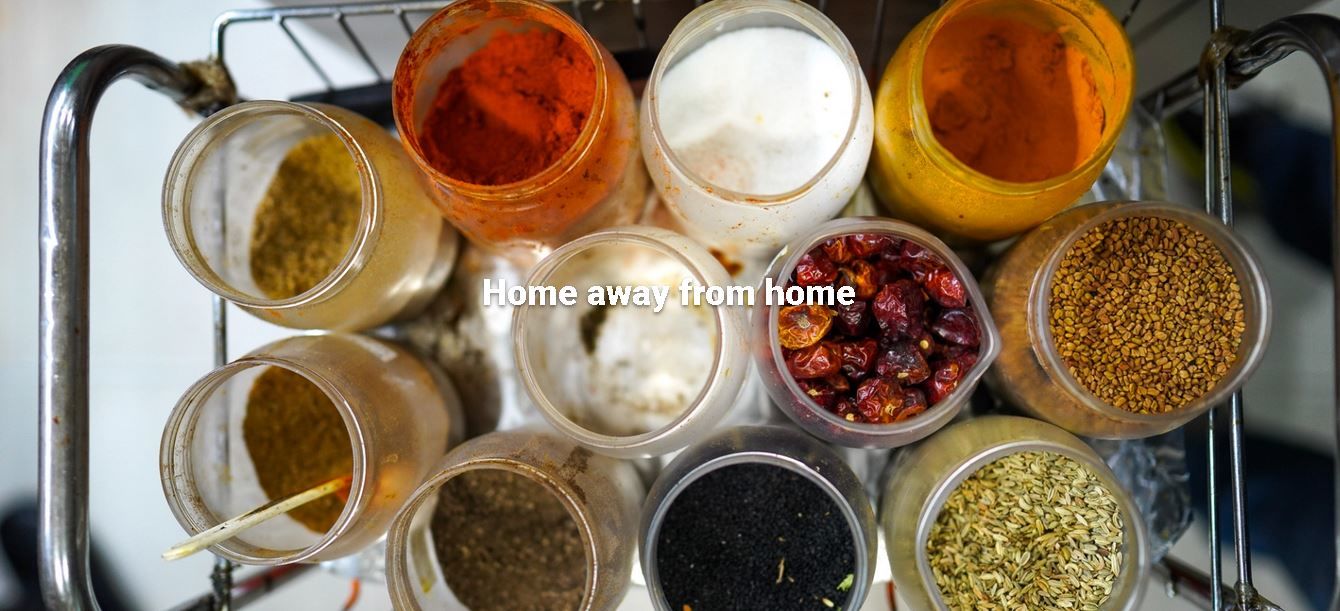 The Punjab Restaurant's spice rack is well-stocked with spices brought in from Pakistan
The Punjab Restaurant's spice rack is well-stocked with spices brought in from Pakistan
The sajji was added to the menu by Head Chef Khadim Hussein, a remarkably calm and soft-spoken man who seems to direct the kitchen in near-silence, his toque and chef’s whites inviolable above the scars and burns that mark his hands and arms.
In fact, his calmness must have rubbed off on everyone else because the kitchen is frenetically busy, but there isn’t much shouting going on. A cook standing by the door barks orders into a PA system, and his is the only raised voice. Also there at the pass counter is Hussein, checking the dishes going out.
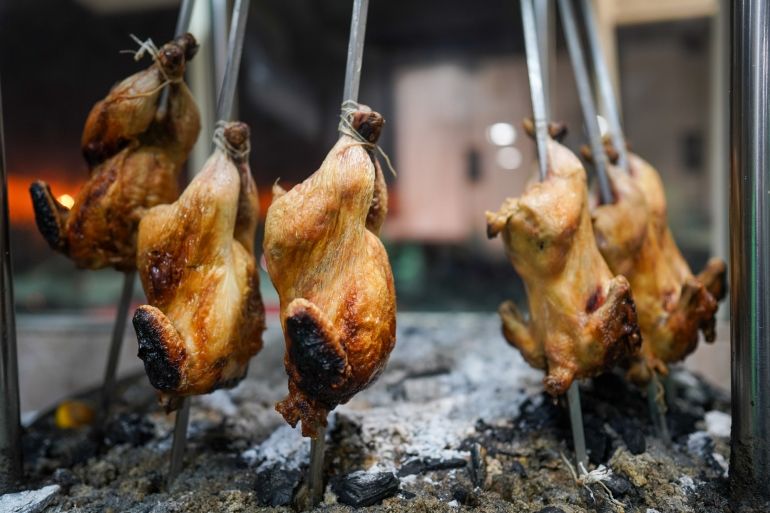 Chicken sajjis have been grilled slowly for hours around a charcoal fire
Chicken sajjis have been grilled slowly for hours around a charcoal fire
Ordering complete, Khan talks about the restaurant. Gesturing around the dining room, he says that Punjab’s backbone is the regulars, people coming here again and again to get the kind of food they love. This food could possibly be made at home by some customers, but it’s so much more fun - and less work - to go out to eat it as a family.
Another Mr Khan, who is dining with his family, says he has been coming to the restaurant since 1985, first with his own father and now with three generations of his family because he himself is a grandfather now. The family sees Punjab as an extension of their home because, he says, they are so comfortable here, popping in for regular meals and booking it as the venue for a lot of family celebrations and gatherings over the years.
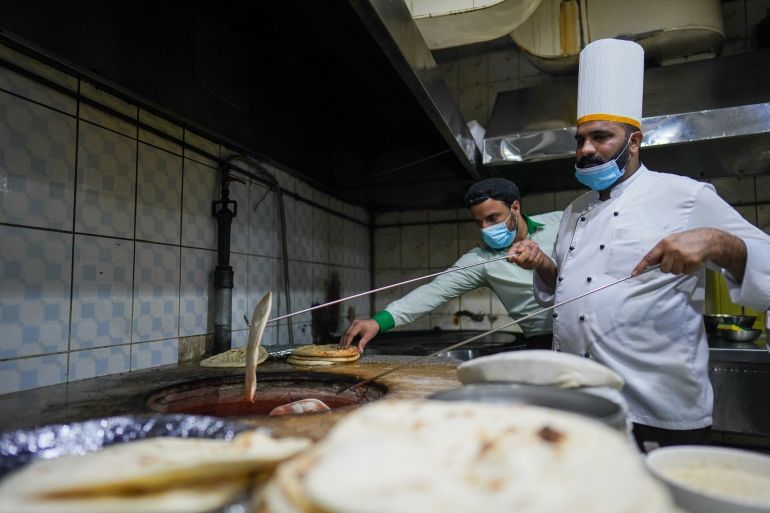 Naan and chapatis being prepared by Chef Hussein at the furiously hot tandoor
Naan and chapatis being prepared by Chef Hussein at the furiously hot tandoor
Izhar Ahmad agrees. He has been coming here for 15 years and swears that the food’s flavour and quality have not changed at all. The business owner also seems satisfied with the range of dishes on offer, pronouncing it a good selection of the regional variety Pakistan has to offer, and says his wife always welcomes dining here instead of creating a mess in the kitchen.
His daughter and son, who are now grown up and have left home, always loved coming to Punjab, he says. His son requested birthday dinners here with dum pukht (slow-cooked mutton with vegetables - think Greek kleftiko) and karahis followed by gulab jamuns and burfis for dessert. Ahmad is pretty sure this is still his son’s favourite meal, even though he has long left home.
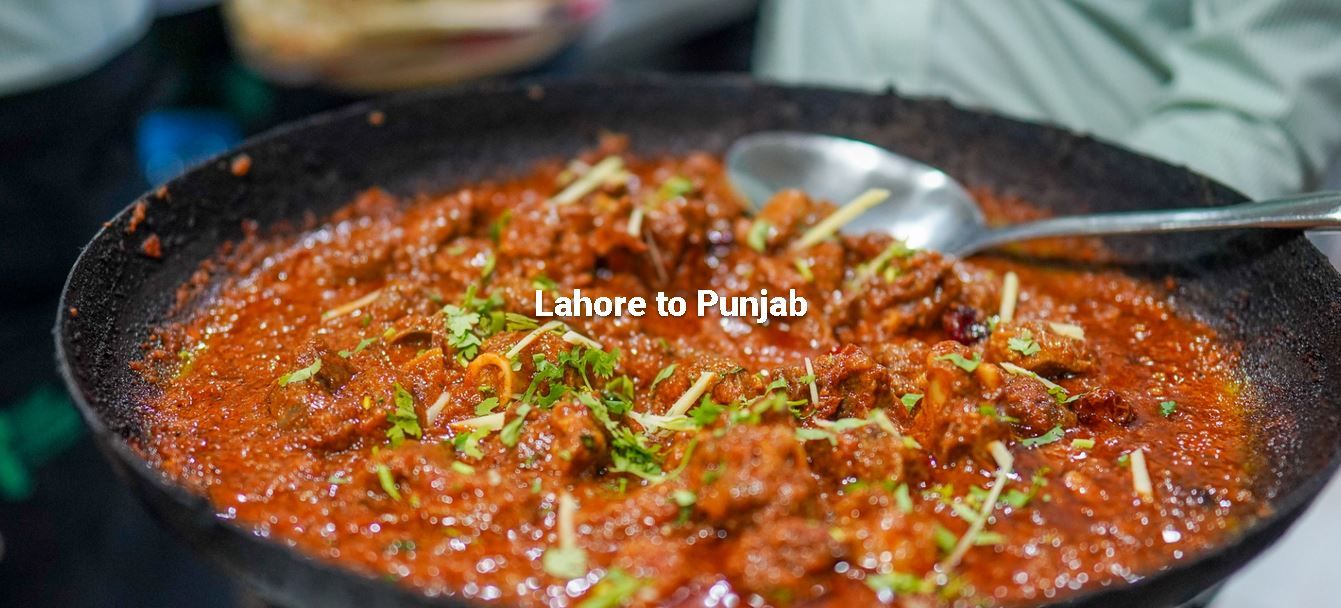 Punjab’s backbone is the regulars, who come here again and again to get the kind of food they love
Punjab’s backbone is the regulars, who come here again and again to get the kind of food they love
The restaurant was founded in 1971 by Abdul Hameed, who started up in a tiny shop where he could only make a few barbecued items and samosas. With time and elbow grease, he expanded into another shop and named this Lahore. The menu was kept small, sticking to biryanis, brain curry and barbecued items. Working with his son, Sajid Pervez Hameed, he expanded even more until they had a restaurant that truly was a cornerstone of the Pakistani community in Doha. Lahore was relaunched as Punjab in 2015 after Abdul Hameed’s partners bought him and his family out.
Make no mistake, this is still very much Pakistani food. In fact, the kitchen only has Pakistani chefs working in it, but there is a universal appeal to be found in the comforting flavours, the spices and the aromas that bring to mind home cooking, wherever home may be.
Having said that, there are two dishes that were plopped on the table that are more from the street food canon of Pakistani cuisine. Chapli kebab and brain taka tak - both dishes that need a lot of elbow grease and big roaring fires for fryers and griddles.
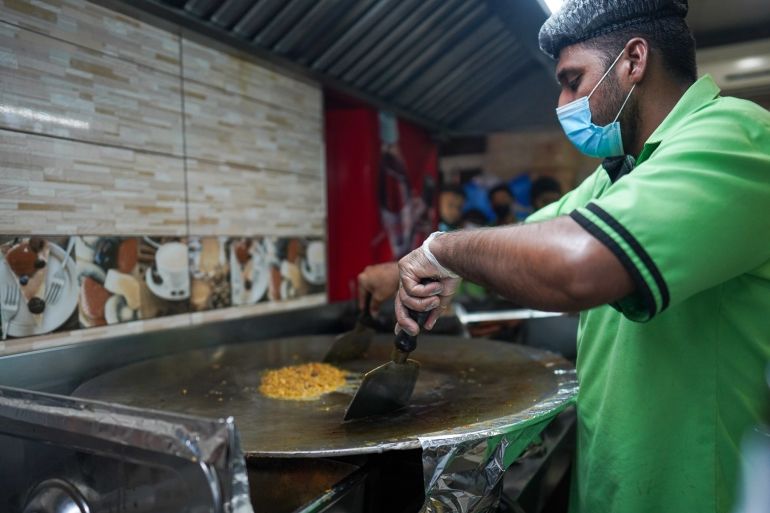 The sound is as big a part of taka tak as anything else
The sound is as big a part of taka tak as anything else
Take the chapli kebab. Mutton is finely chopped by hand and mixed with chopped tomatoes, onions, dried coriander, cumin and other spices and then formed into patties about the size of a grown man’s hand. Then, these savoury, fragrant, slightly fatty patties are fried in oil until their exterior is crisp and brown.
There is nothing in a home kitchen that can mimic the flavour imparted by street fryers, and it is a rare home cook who would want to essentially mince their mutton by hand this way.
Then we come to the taka tak. It is also known as kata kat in Karachi, possibly because it is named after the sounds made as it is cooked. A cook wielding two scrapers with handles stands in front of a searing griddle where he is about to fry onions, ginger, tomatoes and spices with blanched sheep brains.
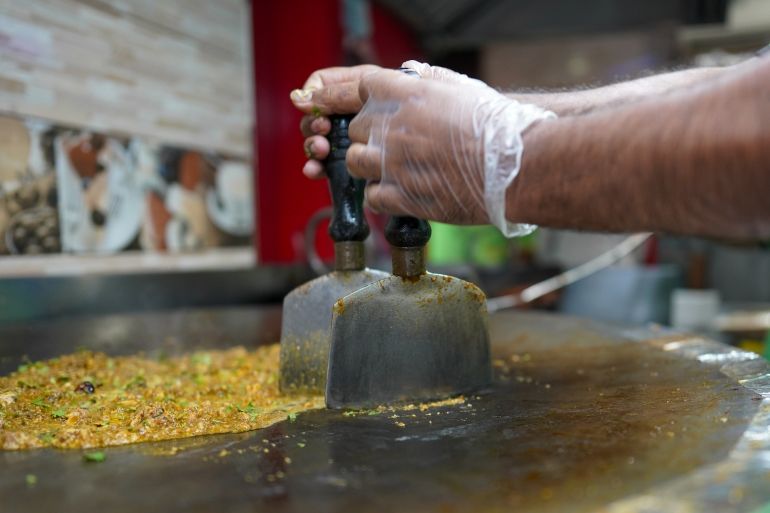 The tapping scrapers chop the brain into tiny pieces, then spices are added
The tapping scrapers chop the brain into tiny pieces, then spices are added
The sound is as big a part of this as anything else, and the cook starts the rhythmic tapping with the scrapers’ blades before he puts the chopped vegetables on the griddle. He then moves them around - tapping the whole time, the fancier the tune the better - until they soften. The brain goes on the griddle next, and the scrapers chop it into tiny pieces, mixing it with the vegetables, moving it constantly until the spices are added and the cook declares it done.
That heat, that griddle and that show all mean that this is a dish best made streetside with as big an audience as possible. Side note, taka tak can also be made with assorted offal, as long as care is taken to choose bits that are similar enough in texture that they all cook at the same time.
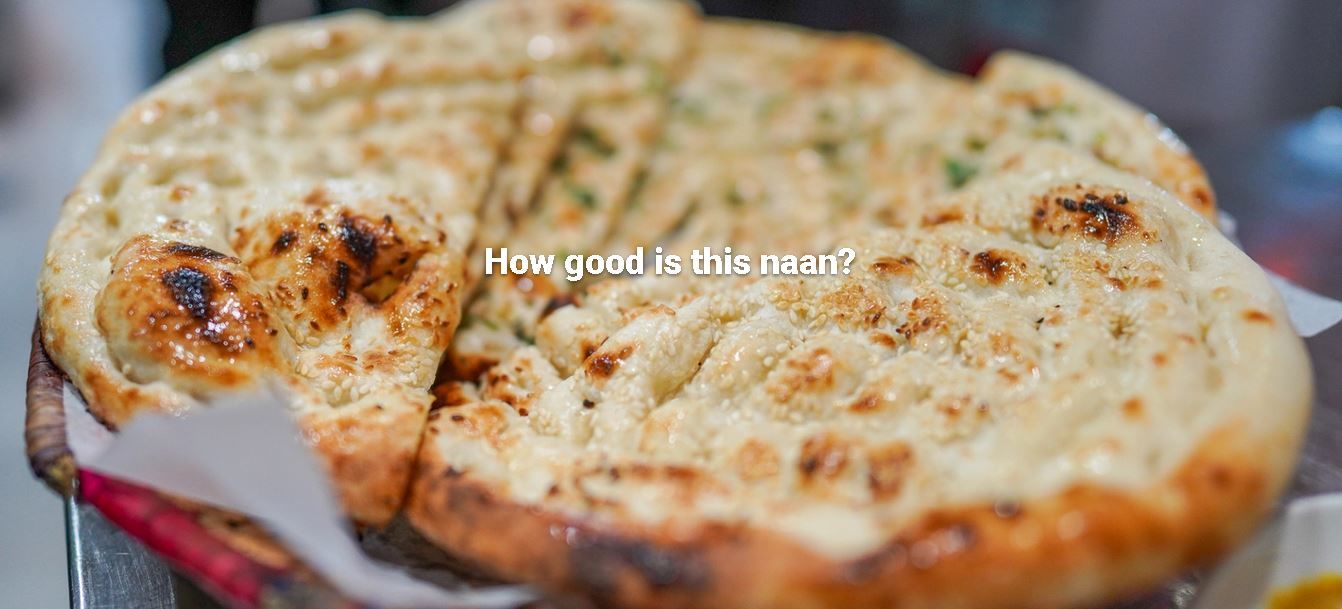 Hot naan glistens with a quick brush of ghee
Hot naan glistens with a quick brush of ghee
The table is pretty full by the time everything is delivered. The karahi is resplendent in its well-seasoned pan, still steaming in its tomatoey gravy - and it delivered all the spiced comfort it promised with tender mutton in a rich, full-flavoured sauce.
The chicken sajji is a sleeper hit because it looks fairly straightforward: half a chicken on top of rice, but the chicken is crisp-skinned and lemony with layered flavours after hours of coal-fired cooking, finished later in a hot pan. The rice is flecked with onions and spices and holds every bit of savoury goodness from the chicken and mutton broth it was cooked in.
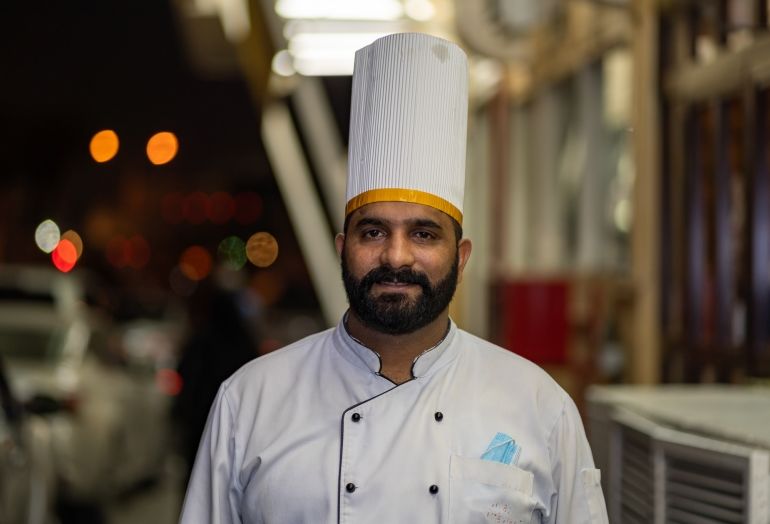 Chef Khadim Hussein
Chef Khadim Hussein
The brain taka tak is another hit, a small innocuous dish of golden curry that just dares you to scoop a bit up with a piece of chapati. It’s so soft! Everything in that flavourful bundle melts in your mouth - except the chapati, which offers a satisfying chew that hovers between the silky and the muscular. The veggies, the brain, those spices, oh my.
If you’ve never had brain, it’s similar in texture to marrow, a bit firmer and less fatty though. If you’ve never had marrow, you’ll just have to try this.
Quiet descends on the table as plates and bowls are passed back and forth and mental notes are made of what dishes to take home and enjoy again.
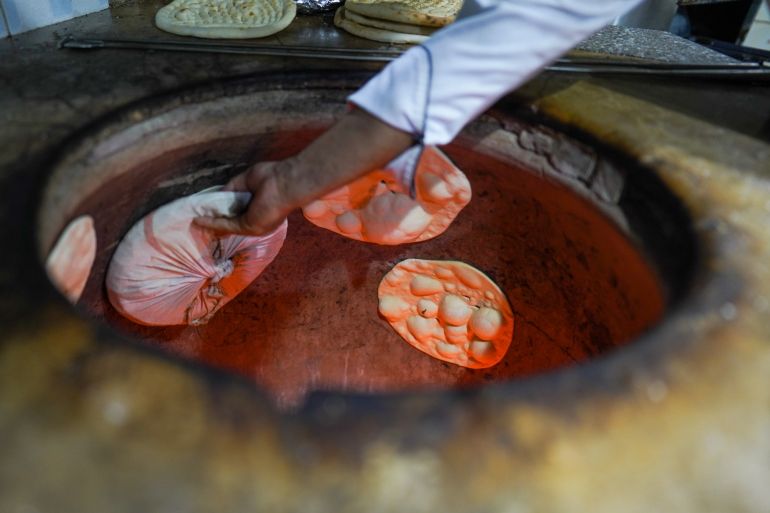 Getting the loaves onto the walls of the tandoor is no mean feat
Getting the loaves onto the walls of the tandoor is no mean feat
How did they get the chicken skin so shatteringly crisp? How does the karahi taste like it has been slow-cooked for days when we had just watched the cook dispatch it in about 10 minutes each? How good is this naan?
We reach the point of satiety, then inch resolutely past it, until we conclude that we can eat no more and should maybe go somewhere else, if only to avoid being tempted with dessert.
So we head downstairs to the restaurant’s office, where three administrative staff work and a lounge area houses a small “command centre”. There are security cameras set up all over the restaurant, including the two dining areas, the kitchens and the entranceways. Khan sits here to keep an eye on everything that is going on.
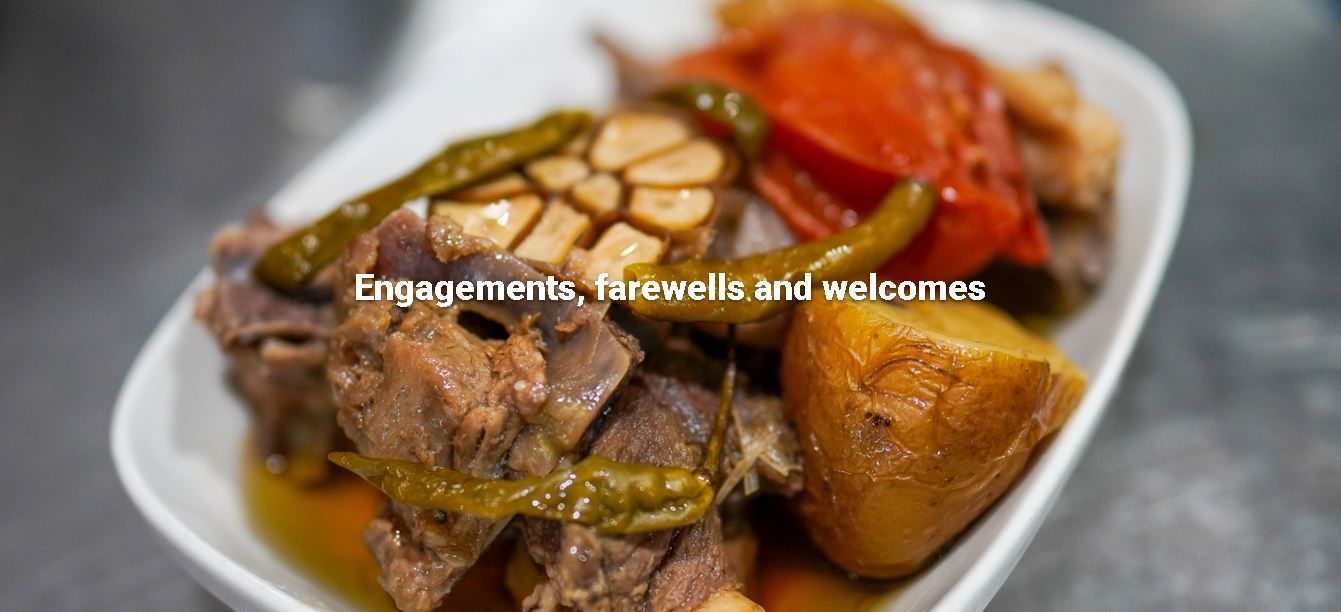 Izhar Ahmad's son would request Dum pukht for his birthday dinners
Izhar Ahmad's son would request Dum pukht for his birthday dinners
Passing around cups of Kashmiri green tea, Khan waves us to our seats and says Chef Hussein will be joining us soon. Right on cue, Hussein arrives, as calm and quiet as ever, and perches on the edge of one of the seats, obviously itching to get back to the kitchen.
He has been at Punjab for seven years, he says, during which time he trained many line cooks and introduced more than one of the weekly specials the regulars love so much - and he, in turn, seems to love his job and his customers.
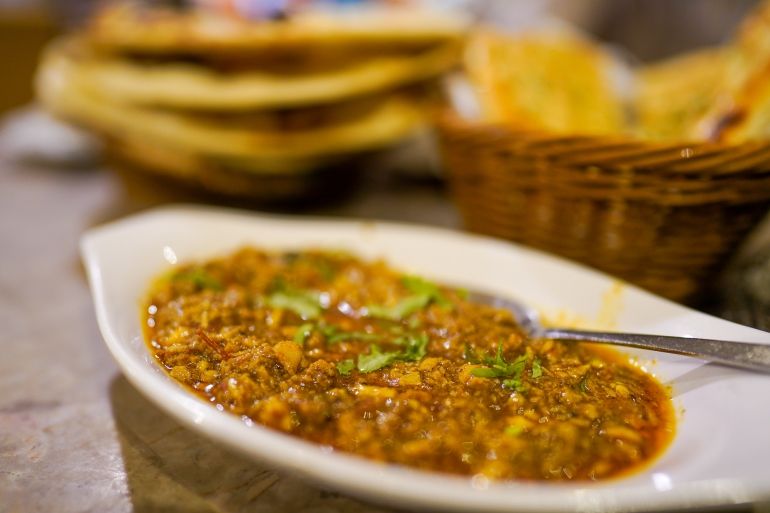 Brain taka tak, a golden curry that dares you to scoop it up with a piece of chapati
Brain taka tak, a golden curry that dares you to scoop it up with a piece of chapati
So how does he run a kitchen without shouting and throwing things? Well, he chuckles, then explains - quietly of course - every person on the team knows what is expected of them and a daily brief before the three-hour prep period takes care of any lingering questions. Once service starts, it’s go, go, go until it’s time to clean up and shut down. He speaks pretty decisively, so we figure his staff are as disinclined to argue with him as we are at the moment.
Hussein is called back to the kitchen in the middle of telling us about the large events the restaurant caters, so Khan continues, explaining that a lot of regular customers call Punjab to cook for their important life events. Graduations, engagements, farewells, welcomes, Punjab has been asked to cater them all.
Does Khan have a favourite memory of working a big event?
 Manager Behzad Khan
Manager Behzad Khan
Not of a big event, he says, but he will never forget the night he had to deliver an order worth several thousand riyals (more than $1,000) to the town of Al Khor, nearly an hour north of Doha. While that sounds like a big order, surely there must be another reason why the restaurant manager himself had to go deliver takeout? Was it a really special client?
Khan bursts out laughing. No, he says, he just happened to be the only one with a valid driver’s license in the restaurant that night.
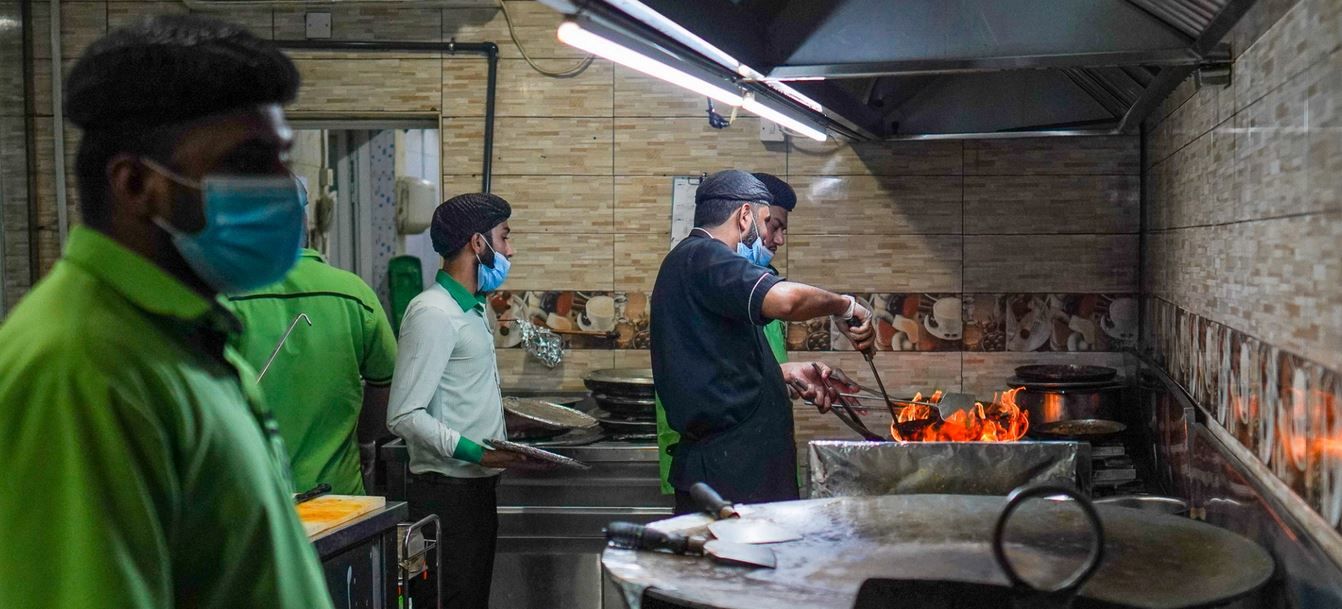 The kitchen is frenetically busy, but there isn’t much shouting going on
The kitchen is frenetically busy, but there isn’t much shouting going on











